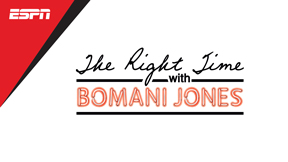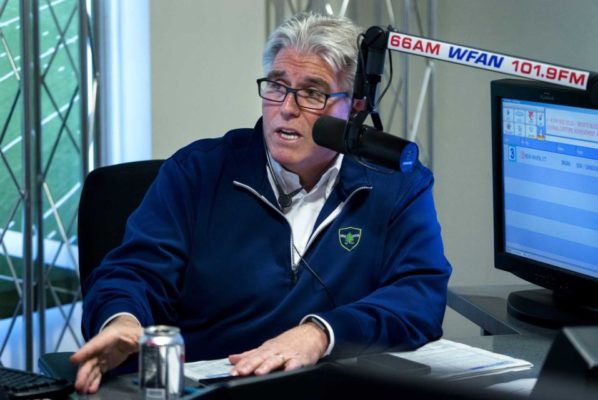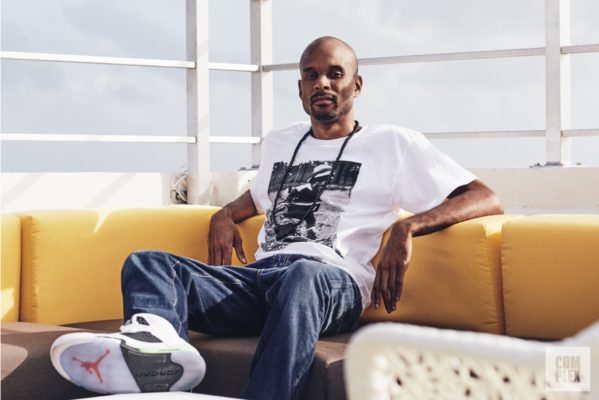It was 2006. The Carolina Hurricanes were on their way to the Stanley Cup Finals. Versus, the pre-cursor to NBCSN, carried the games and made a big deal out of just how into hockey Raleigh had become.
Bomani Jones lived eleven miles west of Raleigh in Durham. He was writing for ESPN’s Page 2 while attending grad school. Where he was, not only was there not the hockey fever the national media was describing, he never even noticed the games on at bars when he would go out at night. Like any good writer, Bomani turned that into content.

At that time, I was hosting the morning show at 96 Rock in Raleigh. Our sister station, an oldies station called Y102.9, was the team’s flagship, so most of the ra ra stuff fell on us. I saw Bo’s article and knew we had to get him on air. That was the beginning of a friendship that has lasted 14 years. I think it was also probably the last time we talked about hockey. That friendship, I would guess, is the reason he agreed to appear on a panel at the BSM Summit in New York this week.
I wasn’t the only one that called Bomani to talk about that column in 2006. Adam Gold and Joe Ovies were hosting the afternoon show at what was then 850 the Buzz. That was Bo’s first exposure to a sports radio audience.
“Joe Ovies called me and said ‘we want to get you in studio on this’ and then Adam Gold found out I lived in town and was like ‘Okay, we need to have this guy in more.'”
For a guy that is as smart and thinks as quickly as Bomani Jones does, it would be easy to think talking about sports was a lifelong ambition.
“Nope. Never considered it even for a moment,” he says when I ask if that in studio appearance was the first step towards one of his goals.
Bomani eventually went on to host shows on 620 the Bull in Raleigh and Durham, the Score in Toronto, and ESPN Radio. Now though, his audio content is off the airwaves and on the internet. That is why I wanted him to be on stage at the Summit.
Bomani is smart. He is creative. His takes come from consuming diverse sources and considering the points laid out in front of him. Radio may not be hurting necessarily, but the national sports talk scene is a lot less interesting without him. As his television show High Noon was about to launch, Bo realized that if he wanted to keep doing The Right Time, it would have to move out of afternoon drive on ESPN Radio and into the podcasting realm.

“It was just the time constraints that came up when the television show started. Three hours per day, five days per week of radio. I didn’t really realize until I stopped how consuming it was and how much energy it took,” he told me.
When Bomani speaks about why he moved away from radio at the BSM Summit on Wednesday morning, one thing that will undoubtedly come up is the lack of diversity on sports radio. He told me that not only did it effect the way programmers looked at him, it made some of them skeptical of his content choices.
“Program directors get so obsessed with programming to who they think their median audience is: someone middle aged and usually white. What has always frustrated me about radio programmers is they don’t have much faith in their audience’s ability to deal with somebody that is not like them.
“I swear, I have seen enough to indicate this to me, man. Your audience can handle more than you think they can. Your audience just wants entertaining content, and entertaining content can come from a broad range of people. Now, you do need someone that can relate to the audience and understands where they come from, but I could relate to those audiences through shared experiences. Me being black and them being white didn’t mean that we didn’t have things in common, and I think that a lot of programmers struggle to recognize that can be the case.”
With The Right Time podcast, Bomani has found a place for his audience to get his show exactly how he envisions it.
“Since it’s an opt-in product, we get a lot more flexibility on what it is that we can do,” he says. “Part of what I think makes me good as a radio product is the ability to go and do a bunch of different stuff and talk about different things that maybe aren’t exactly in sports, but are tangentially connected. Maybe it has nothing to do with sports. Now we can do that on a podcast, because we aren’t worried about somebody scanning the dial on a sports station, hearing a tech story and wondering ‘what am I doing here?’ With a podcast, they know what they’re doing there.”
That audience has a potential ceiling in Bomani’s eyes though. That is why it was so important the show came out of the gate strong and maintained a consistent level of quality when it transitioned away from being a radio show. With podcasting, Bomani doesn’t have the advantage of catching the attention of someone just scanning the dial.

“You really really need the first people who listen to love it. They can’t just like it. They have to be out here telling everybody ‘Man, this is a great show’ every time you send it out.”
Make no mistake though, Bomani Jones doesn’t hate radio. He isn’t the type of guy to tell you radio is dying. In fact, he was quick to tell me that he still considers himself “in many ways, a tried and true radio dude.”
That is why, in addition to reconnecting with old friends, Bomani has a list of people he is excited to meet and hear from at the BSM Summit in New York. He speaks glowingly of Pat McAfee. The duo share an agent but haven’t really interacted very much, so he is looking forward to getting some face time with another ESPN star.
And then, there’s the Sports Pope.
“I just want to see Mike Francesa in the flesh,” he says laughing. “I’ve never met Mike Francesa. What he is is your standard local radio guy. It’s just his local has 20 million people. I am really fascinated by the idea of that and how you sustain that.”

Radio still, very much matters in the eyes of Bomani Jones. He even says if all things were equal, he would still be doing a radio show. “No question.”
It’s not that Bomani doesn’t believe in the digital space. He will be the first to acknowledge that podcasting isn’t just the future. It is the present for a large audience. Maybe in said future radio won’t have the impact it once did, but in 2020 radio matters, particularly in the sports world.
“I think about some of the long, flowing things people have written about Dan Le Batard’s radio show. They aren’t doing that if that’s just a podcast,” Bomani says of the praise heaped on his former TV partner. “Radio still carries a caché. It still has that intimacy. To me, the best part of radio will always be the connection with the people that listen to you.”

When Bomani talks on Wednesday about why he chose to move away from radio, it won’t be with animosity or bitterness. This is a guy that clearly loves the medium and the format. He just wants to see the voices we don’t hear from enough get a microphone and room to grow and thrive. Creating that environment and improving the sports radio landscape is something he says is “hugely worth the fight.”

Demetri Ravanos is a columnist and features writer for Barrett Media. He is also the creator of The Sports Podcast Festival, and a previous host on the Chewing Clock and Media Noise podcasts. He occasionally fills in on stations across the Carolinas in addition to hosting Panthers and College Football podcasts. His radio resume includes stops at WAVH and WZEW in Mobile, AL, WBPT in Birmingham, AL and WBBB, WPTK and WDNC in Raleigh, NC.
You can find him on Twitter @DemetriRavanos or reach him by email at DemetriTheGreek@gmail.com.







